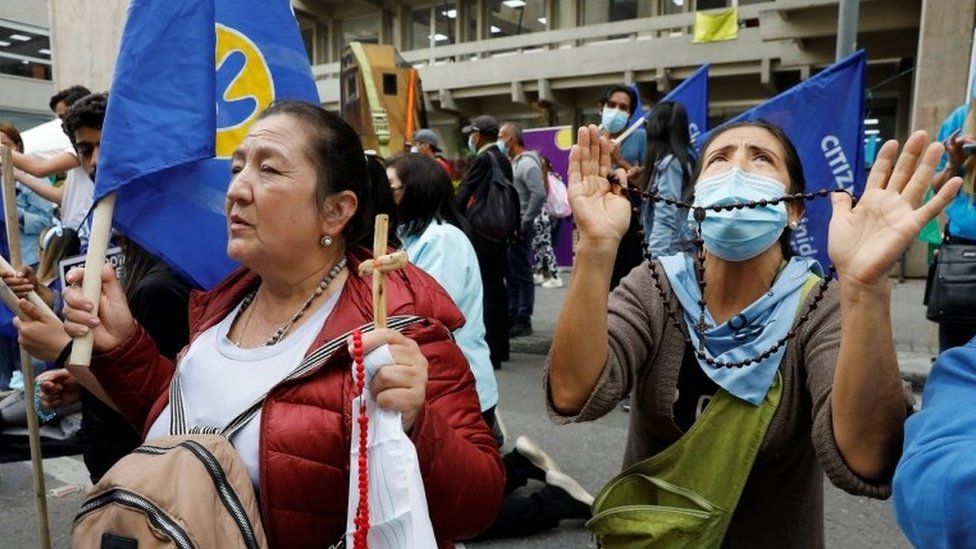Colombia's constitutional court has decriminalised abortions within the first 24 weeks of pregnancy.
Under the new rules, no one will be prosecuted for having an abortion within that time frame.
Since 2006, abortions have been allowed in Colombia in cases of rape, when the woman's life is at risk, or if the pregnancy is not viable.
The ruling was welcomed by pro-choice groups, who called it "a historic achievement".
But Archbishop José Luis Rueda said the Catholic Church would "continue to proclaim, defend and promote human life from gestation until natural death".
Pro-choice activists say it is the latest in a series of victories in recent years, including a similar ruling by Mexico's Supreme Court in September and the legalisation of abortion up to the 14th week in Argentina.


This is a massive step for Latin America, a Catholic region and one with deeply conservative values.
But the fact that Mexico, Argentina and now Colombia have decriminalised abortion feels like there is momentum growing.
The activist movement in the region has been huge these past few years and that has definitely influenced change.
But the fight is not over yet. Many Latin American countries still severely limit abortion rights, namely Brazil, the region's biggest nation by far.
And in several Central American states abortion is banned outright, even in the case of rape and incest.
There are women in prison serving long sentences, many of whom say that they suffered miscarriages. But with so few reproductive rights in some countries, women who need medical help are instead abandoned by the state.

The ruling came about as a result of a lawsuit filed by the umbrella group Causa Justa (Just Cause) whose aim is to have abortion removed from the penal code.
Causa Justa argued that because abortions were defined as a crime outside of the three cases allowed under the 2006 ruling, doctors who performed abortions and their patients were often stigmatised.

The group estimates that 90% of abortions in Colombia are carried out clandestinely, putting the health and life of women at risk.
While Monday's decision has not removed abortion from Colombia's penal code entirely, it is seen as a victory in the battle to widen access to the procedure.
Following its 5-4 ruling, the court urged the Congress and the government to come up with legislation which will protect the rights of pregnant women, including providing family planning services, eliminating obstacles to abortion care and helping with adoptions.
Latest Stories
-
CJ’s suspension: Why aren’t other judges facing removal? – Ex Deputy A.G. fumes
15 minutes -
CJ’s Suspension: Prima facie establishment has no basis – Ex Deputy A.G
50 minutes -
ASFC 2025: Ghana U-15 girls promise to ‘kill themselves’ in final against Uganda
53 minutes -
Pope Francis: Mourners reminded of his call to ‘build bridges not walls’
58 minutes -
Telecel’s short notice to increase broadband price unfair – CUTS International
1 hour -
ASFC 2025: CAF concludes Young Reporters Workshop in Accra
1 hour -
IMF projects 4% growth rate for Ghana in 2025
2 hours -
Livestream: Newsfile discusses suspension of CJ and galamsey
2 hours -
ASFC 2025: CAF President Dr Motsepe arrives in Ghana for finals and key meetings
2 hours -
Plan International Ghana applauds government’s move to tackle menstrual poverty
2 hours -
+233 hosts Int. Jazz Day concert on May 3
2 hours -
Finance Minister meets IFC MD to deepen cooperation in key sectors
3 hours -
PUWU hoists red flags nationwide over gov’t plan to privatize ECG and NEDCo
12 hours -
Kwame Yesu’s latest project blends raw emotion with rap precision
13 hours -
Court remands Mobile Money robbery suspect into police custody
14 hours

